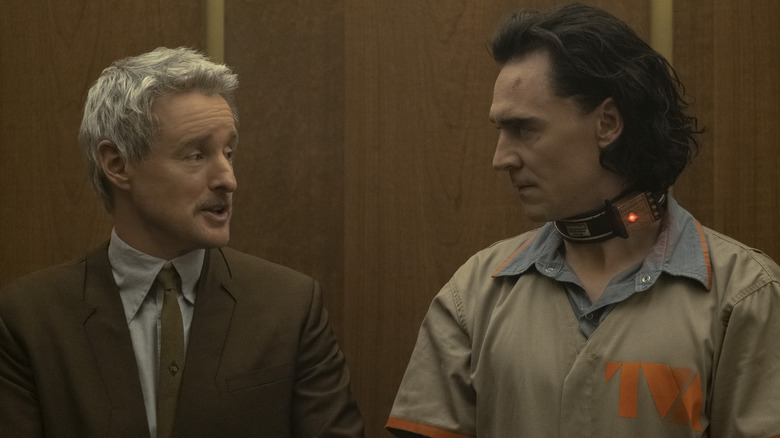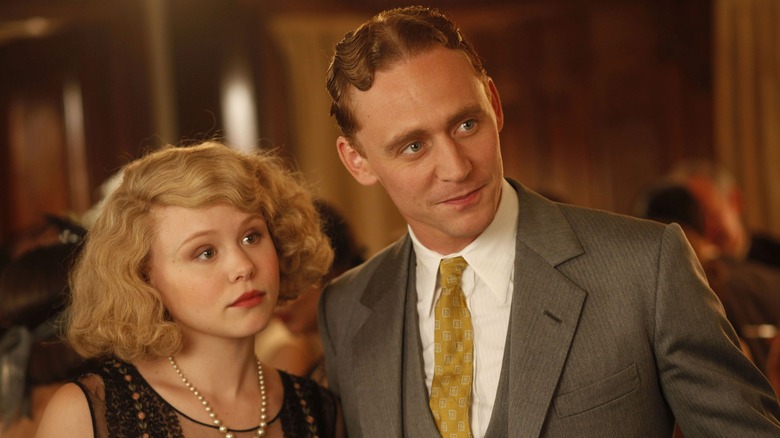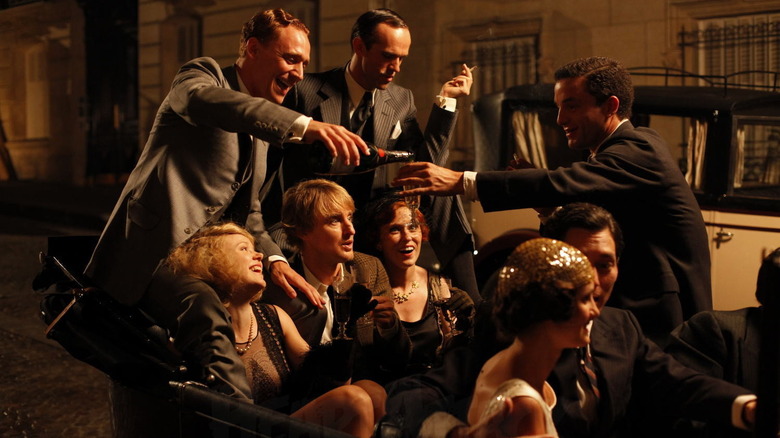Loki Isn't The First Time Owen Wilson And Tom Hiddleston Have Time Traveled Together
One could make — and no doubt some resourceful Marvel Cinematic Universe fans have made — a video about Loki (Tom Hiddleston) hooking up with different characters in the MCU using footage from Hiddleston's non-Marvel projects. The actor had a tragic affair with Rachel Weisz (Melina Vostokoff in "Black Widow") in "The Deep Blue Sea," played one-half of a pair of vampiric lovers along with Tilda Swinton (the MCU's Ancient One) in "Only Lovers Left Alive," and starred as Hank Williams in "I Saw the Light," with the Scarlet Witch herself, Elizabeth Olsen, playing the late country music legend's wife. Hiddleston even had a fling with Elizabeth Debicki (Ayesha in the "Guardians of the Galaxy" films) in "The Night Manager," in addition to a non-zero amount of sexual tension with "Captain Marvel" actor Brie Larson in "Kong: Skull Island."
Tragically, Hiddleston did not romance Owen Wilson during the film they made prior to sharing the screen in the MCU Disney+ series "Loki," so all you Loki and Mobius shippers ("Lokius" shippers, to use their proper name) are plum out of luck. Coincidentally, however, the film in question, "Midnight in Paris," involves time travel, much like Hiddleston and Wilson's shindig in the MCU, and was a critical and financial hit when it came out in 2011, grossing $162 million against a $30 million budget. The film would go on to secure four Academy Award nominations the following year (including one for Best Picture), ultimately taking home an Oscar for Best Original Screenplay.
It was also written and directed by, um, Woody Allen. So let's talk about that.
The Woody Allen of it all
Allen's career was in a dramatically different place at the start of the 21st century. The "Annie Hall" filmmaker had spent the previous three decades releasing a new film nearly every year, many of which bowed to critical acclaim and managed to turn a profit thanks to Allen's thrifty productions. The 2000s, on the other hand, were a considerably bumpy ride for him. Allen continued to make a new film annually, but for each one that hit ("Match Point," "Vicky Cristina Barcelona"), there were two or more that fell flat on their face. It also became near impossible to ignore the gnawing feeling that Allen the writer had run out of fresh insights to offer about the human condition.
Then came "Midnight in Paris," which was readily his best-received film since his heyday in the late 20th century. Allen would score a similar success two years after with "Blue Jasmine," directing the film's lead, Cate Blanchett, to an Oscar win in the process. This was also when the allegations that Allen had sexually assaulted Dylan Farrow as a child, which were originally made back when Allen and Dylan's mother, Allen's former partner/actor Mia Farrow, had separated in the early '90s, returned to the spotlight. Not long after that, Dylan Farrow wrote an open letter detailing the assault and calling on other artists to stop working with Allen, which the filmmaker responded to with his own letter denying the allegations.
Things only got messier from there, with Mia Farrow's adopted son Moses Farrow and adopted daughter Soon-Yi Previn — who married Allen after their much-publicized affair led to him and Mia Farrow breaking up — both alleging Mia Farrow had abused them (which, obviously, doesn't negate Dylan Farrow's allegations against Allen or vice versa). More recently, in 2021, the well-received docuseries "Allen v. Farrow" presented a pretty damning case against Allen.
The problem with nostalgia
Prior to all that, though, the allegations against Allen had largely faded from the general public's memory, and "Midnight in Paris" seemed to signal a promising new chapter for the auteur when it came to his creative pursuits. Sort of.
"Midnight in Paris," you see, centers on Gil Pender (Wilson), a prosperous screenwriter who's grown tired of writing pablum for Hollywood and wishes to pursue a more artistically satisfying calling. He's also a huge fan of the historic Parisian art scene, which comes in handy when he and his fiancée Inez (Rachel McAdams) take a trip to the French capital. There, Gil discovers he can journey back in time to the 1920s at midnight every night. In doing so, he encounters such colorful figures as F. Scott Fitzgerald (Hiddleston), Gertrude Stein (Kathy Bates), and Salvador Dalí (Adrien Brody), all of whom help Gil to rediscover his passion.
While there's fun to be had in watching skilled character actors ham it up as larger-than-life artists from the early 20th century (Brody alone gets an impressive amount of mileage out of repeating "rhinoceros" in his silly faux-Spanish accent), "Midnight in Paris" is otherwise pretty unremarkable. Gil himself is a painfully milquetoast protagonist and the film is only able to coast so far on Wilson's charm alone. Then there's poor Rachel McAdams, a fantastic actor saddled with playing a misogynistic stereotype in the form of Gil's nagging, unfaithful wife-to-be. Even cinematographer Darius Khondji's romantically-lit visuals and the scenic backdrop of real-life Paris are partly sabotaged by Allen's listless approach to staging the action.
Honestly, anyone who bemoans Allen's fall from grace or has fond memories of "Midnight in Paris" would do well to remember Gil's epiphany at the end of the film: the past is never as rosy as we'd like to believe.


